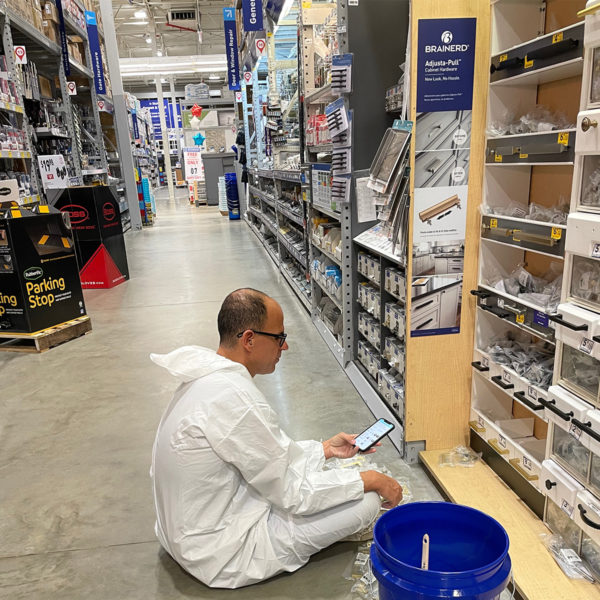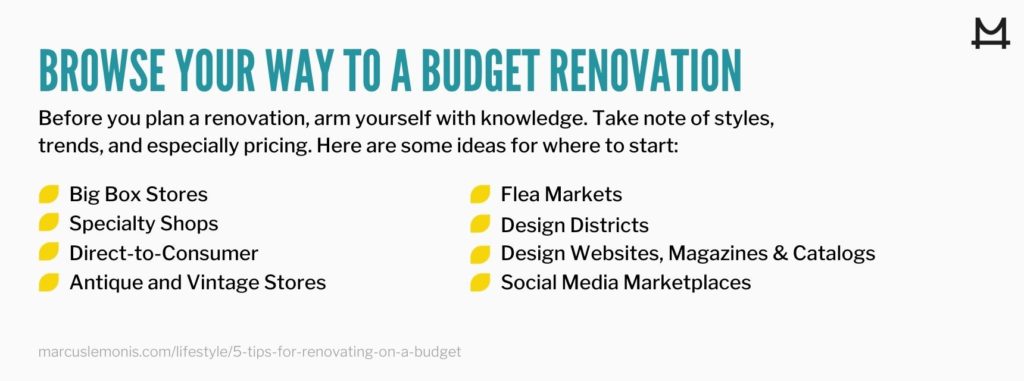There are a lot of things that constrain us from being creative with home design. A limited budget is a big one, especially when you’re talking about renovation.
The reason that I felt strongly about creating a show at HGTV — The Renovator — is that I felt like I could give people a different way to think about things, another entry point. For instance, there are many choices to make and expenses to plan for when making changes to your home, which can quickly become overwhelming.
Here, I have streamlined ways to approach a renovation with five quick tips that will help you make decisions, save you money, and reduce renovation-related stress.

1. Begin Your Browsing at Big Box Stores
Big box retailers are quintessential, both as a starting point and a stopping point for any homeowner. You really get the holistic view: what are the trends in the market? What are the options? What are the prices?
When you go into one of these stores, you’re always going to see three tiers–good, better, and best–in terms of options, whether that’s the kind of shower that I’m putting in, or the pendant lighting, or the tile.
It’s important to go to those retailers, whether you’re going to buy what you need there or simply as a jumping-off point for your design. They have teams of specialists that are doing the research, looking at the market trends–sometimes even setting the trends. You are going to find great value because they buy better than you can buy as an individual. Or, if you prefer to shop at an independent local business, you’ll at least have the knowledge of what the big box stores are carrying, and what they’re charging for it.
2. Hunt for Discontinued and Other Reduced-Price Items
OK, so you have ideas for what you’d like to buy. Now try to search for bargains. One secret that I have is that I go to a lot of tile shops or tile company websites, and I look for close-outs. Same goes for wallpaper, flooring, and other things you’ll need for a renovation. Especially if you are only looking for a small amount, remnant programs can save you a lot of money.
You can also mix and match, combining a few remnant pieces to create a subtle pattern. For example, if you’re tiling a shower, rather than purchasing one tile pattern at full price, try assembling a look from two or three close-out tiles that will not only save money but add a unique stylistic touch. I like to take chances and get a good deal. When I succeed, the perceived value is high, but the actual cost? Not as high.

3. Make Little Changes for a Big Difference
Say you want to rehab your kitchen but don’t have the budget for a full cabinet replacement. What can you do? A lot of people are going to go with the easy answer: clean them out, sand them down, and repaint them. But there are other things you can do, too.
For me, hardware is a huge change. Let’s say you have $550 to redo your entire kitchen. You can find beautiful hardware for $4.99 or $5.99 a knob.
And if you want to go a little glitzy, $8.99 to $10.99. Having fun with hardware, having fun with paint colors—that’s a simple way to make changes that will have an effect.
Then, if you have an extra $1,000, you could start to change the backsplash in your kitchen. With $2,000-$3,000, you can potentially change the countertop as well. Suddenly, the aesthetics of your kitchen look different, even without a complete renovation.


4. Shop Direct to Consumer for Added Savings
You may buy 48 percent of the things at the big box place. You may buy another 24 percent of the things at a more curated, customized retailer. And then you may buy the rest from what’s called “D-to-C,” direct to consumer companies. These are manufacturers that will sell directly to you and allow you to have some savings.
Now, the process is a little different with D-to-C. It’s not as easy to get the customer service or expert advice and opinions, like you’ll find in big box or specialty stores. Also, the products get shipped to your home, rather than you walking away with them. But, if you invest a little bit of time into doing your research and asking the right questions, you may be able to deliver more value to your home than just walking into one place and saying, “I’ll take everything here.”

5. Think About How You Buy Clothes
If you want to change people’s opinions about the way that you dress, you can’t just wear different pants. You have to take a look at your wardrobe and think of what you can afford to replace or upgrade. Maybe you change your belt or your shoes. (Just make sure they match—never wear a black belt with brown shoes!) Or maybe you buy a new jacket that’s versatile enough to pair with different outfits.
The same thinking applies to making renovations. Think about what you need, what you can afford, and what will have the most effect in terms of creating a different look and feel for your home. Just as you wouldn’t throw out all of clothes and start a wardrobe from scratch, you can approach a home renovation with the idea of implementing subtle changes. When executed well, you can achieve meaningful changes without spending tens of thousands of dollars.




